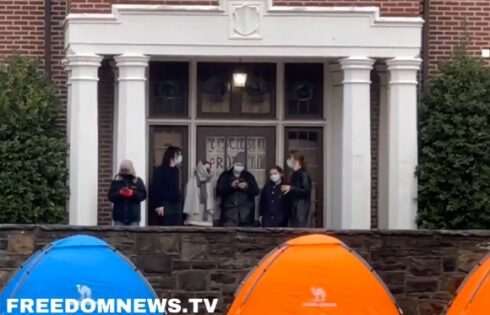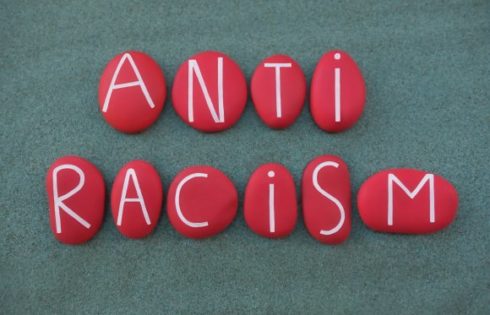
No racist intent, but still ‘harassment’ because of ‘impact’
A public university bound by the First Amendment is defending its decision to punish a sorority because some of its members “caused emotional distress to a person of color.”
West Virginia University’s Alpha Phi found itself embroiled in the blackface panic sweeping the nation’s colleges and universities, even though the administration eventually admitted there was no blackface incident.
WVU officials have yet to specify the intent of the “black-faced doll” that was found hanging in the Alpha Phi house. Though a spokesperson provided a statement Sunday that he “believe[d]” answered College Fix questions, it did not answer what WVU’s investigation determined was the intent.
The person of color who was emotionally harmed by the hanging doll is “related to the organization,” but the complaint “was not brought to the University by a member” of Alpha Phi, wrote John Bolt, senior executive director of communications.
He declined to comment on why the sorority’s parent organization said some WVU members had apologized for the “racist nature of their behavior,” when the university determined there was no racist intent. Alpha Phi International did not respond to Fix emails and phone calls last week.
The Foundation for Individual Rights in Education, which has publicly scolded universities including WVU for violating the due process rights of Greek-letter organizations, declined to comment. FIRE recommended asking the West Virginia affiliate of the ACLU, which did not respond to a Fix query.
The sorority apparently received physical threats after the doll incident was publicized. The Daily Athenaeum student newspaper reported that two police cars were parked outside Alpha Phi’s house the evening of March 4, two days after it published photos of the doll.
A police spokesperson said the house was receiving “extra security” due to media attention to Alpha Phi.
MORE: WVU denies ‘end run’ around due process to punish Greeks
I noticed two Morgantown police cars parked at the Alpha Phi sorority house at 8 p.m. last night, so I asked Andrew Stacy, the Morgantown public information officer, about it.
"The cruisers were there for extra security as a result of ongoing issues," he said over email.
— Douglas Soule (@DouglasSoule) March 5, 2019
Sorority agreed to ‘microaggression, implicit bias and race’ training
The university withheld the details of Alpha Phi’s behavior for the rest of the month after the newspaper reported on its interim suspension Feb. 13.
Bolt would only tell the Daily it was a “concerning incident that did not involve any physical harm” to anyone at Alpha Phi.
Nine days later, WVU rejected the newspaper’s Freedom of Information Act request. It had sought communications about the sorority between the dean of students and director of the Office of Fraternity and Sorority Life, and between the parent organization and those officials.
The administration cited “on-going student and/or employee investigations” that made the sought records “exempt at this time.” Even if the newspaper filed another request “in the future,” however, “the documents are most likely exempt” as education records under the Family Educational Rights and Privacy Act.
The newspaper published photos of a “baby doll with a blackened face” on March 2. It was hanging in two photos, while the third included a person wearing a WVU Alpha Phi shirt who was holding up the doll. The next day, the university released a statement.
WVU said it investigated after receiving “an allegation that a black-faced doll was found hanging” in the sorority house. That same evening, officials held a meeting with the sorority: “More than 100 members were present.”
When the investigation finished, the administration determined that the incident “was not one of intended black face, as had been originally described in the complaint.”
Because of the “impact rather than intent” of the incident, however, the university still decided to punish the entire sorority, not just the members who hung and held the doll. It cited an unspecified violation of the Campus Student Conduct Code.
The sorority agreed to educational penalties and ongoing compliance mandates. They include attending “various awareness trainings, including microaggression, implicit bias and race,” as well as community service each semester through next academic year and regular meetings with the Office of Fraternity and Sorority Life.
MORE: Stanford kicks out fraternity because it ‘needs improvement’
A WVU investigation into its chapter of Alpha Phi after an allegation of a black-faced doll seen in the sorority house determined that the doll displayed was "not one of intended black face," according to a University news release.https://t.co/faEOHOlfZ3
— The Daily Athenaeum (@DailyAthenaeum) March 4, 2019
One code mentions First Amendment; the other doesn’t
Spokesperson Bolt provided The Fix information that was not included in the university’s public statement or Daily Athenaeum reporting.
He said the sorority accepted responsibility for “harassment” and that Alpha Phi International also signed the resolution. The student code defines harassment as “conduct that creates a Hostile Environment and is based upon” protected categories including race. It also says: “In no event shall this provision be used to discipline a student for speech protected by the First Amendment.”
The harassment definition cites Board of Governors policy. It says harassment can include, but is “not limited to, name-calling, graphic or written statements (including the use of social media, text messages, e-mail, or other similar forms), or other conduct that may be physically threatening, harmful, or humiliating.”
Conduct without “intent to harm” can still count as harassment, according to that policy. It also doesn’t need to be “directed at a specific target, or involve repeated incidents.” Notably, the BOG policy doesn’t mention free speech or the First Amendment.
Bolt did not directly answer multiple questions from The Fix, including whether WVU claims it can punish students for an undefined negative “impact” on the community, as its statement suggests; whether any member of the sorority at the 100-member meeting said they were upset by the doll; and how the sanctions are relevant to the violation if it wasn’t a blackface incident.
“Though the students claim it was not their intention, the impact of certain members’ decisions caused emotional distress to a person of color related to the organization,” Bolt wrote. “The students indicated that they did not realize that by hanging a baby doll with a darkened face by its neck could potentially trigger a person of color through visions of lynching.”
The university’s public statement said Alpha Phi International was also conducting an investigation and that it had required the chapter to conduct a “mandatory bystander workshop.” The sorority’s interim suspension was lifted when it accepted university sanctions on March 1.
The parent organization initially supplied incorrect information to The Daily Athenaeum. It said the chapter had been placed under “immediate suspension based on the highly inappropriate action from some members,” who were “no longer members.”
On March 4, a day after the university’s statement, Alpha Phi International said it was not correct that “active members of the chapter had been dismissed due to this incident.” The entire chapter, not “specific individuals,” have been sanctioned by the university, it added. Bolt also told the paper the university was not aware of any sorority members dismissed because of the incident.
MORE: UTK disgusted by students in ‘charcoal face masks’
IMAGES: Aspen Photo/Shutterstock





Please join the conversation about our stories on Facebook, Twitter, Instagram, Reddit, MeWe, Rumble, Gab, Minds and Gettr.